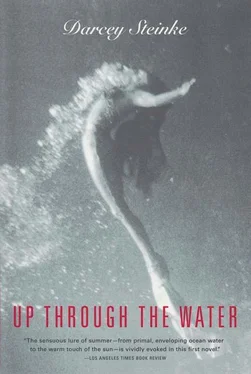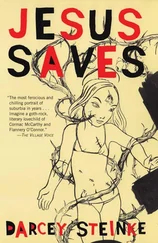“You get used to it,” he said, a cigarette dangling from his bottom lip.
“You could get used to living in mud,” Eddie said. He lobbed gravel from the parking lot into the sea.
The water glittered. Tourist sailboats rocked. He followed a sea gull, just a thin line like a hair on paper.
“This island isn't different from anywhere else,” Neal said. “We move around as much as anybody. It's the small things really.”
Eddie examined the slack skin of his fingertips; his hands were like an old person's. “The hazards of dishwashing,” he said, holding them up, pressing the air flat against his palms.
Neal, his head still resting on the open window frame, tied a red bandanna around his neck. He pulled a joint like a piece of scrap paper from the glove compartment.
The waitress yawned and leaned back against the windshield. “People have no right to say the things they do to one another,” she said.
Eddie searched for a smooth flat rock and finally found a thin black one. He looked up to the red moon. No Giants. The water lapped silver. No Mermaids. Just Neal singing an old Stones song with the radio and the waitress getting high on the hood of the car. Eddie walked to the water's edge, slung back his arm, and spun the rock. It jumped one, two, three times, touched the dark water under the moon, and then fell easily, obviously straight down to the bottom of the sea.
In the kitchen Emily sat at the table drinking a rum and coke, the ice cubes clinking like tiny bells. Her face ached, the clotted cuts looked like speckled jam, and black and blues edged up through her skin. The red hole of her cigarette moved up to her mouth, then down to rest on the lip of the clamshell ashtray. The second hand moved like a lazy fluorescent fish on the clock's glowing face. Emily stared again at the refrigerator until it swayed, lost matter, and finally disappeared. She concentrated on the stove, sink, cabinets — willed each gone. Last was the table. It blurred, twitched, vanished. She emptied her glass, eyes falling to the twisted sheets on the bed and then up to the moon.
Each time it was full, she strained her eyes to recognize the crater shapes and letters that were etched on its rocky surface. She always felt, if she could see them, they might be decipherable symbols that would tell her things. She looked into her palm, the lines deepening and ridging, maybe the answers could be read there, but there was no secret in the crosshatch marks and deltaed lines of her hands.
She heard tires on the shell street. Eddie's raspy voice saying good-byes to people from work. He came in the door and carelessly threw open the refrigerator. She turned her face away, a profile against the sharp light, stood, and walked the two steps to him. Bending over into the icebox, she fingered the sliced ham and reached for mustard.
“I'll make you something,” she said, her hand to her mouth to hide her sliced lip.
“What did John Berry do to you?” Eddie asked.
“I fell,” Emily said, her boozy words muted.
“I'll kill him,” he said through his teeth. “That son—”
Emily put her hand over his mouth. Eddie closed his eyes and breathed in as though he was inhaling the sweetest air of his life. She fingered the pocket of his T-shirt. The refrigerator door smacked shut like a wet kiss. He reached out for her, his fingers like a baby's. He placed a hand at the small of her back and held his cheek to hers as if slow-dancing.
J ohn Berry lifted his hand in mock offering of a cracker and the gulls swooped down. He kept his fist clenched — searching for the biggest, dirtiest one, the loudest cawer. He sung his other arm up and aimed the pellet gun, and in a seemingly simultaneous thud the steel ball left the gun and lodged in the gull's feathered breast. Blood specks blew on John Berry's arm and face, and the gull fell quickly into the moving soundside water.
It had been six days since the bottle incident. After it, he had shot gulls farther out in the marsh. He'd get ten, one every half hour, and lay the loose birds in the pattern of a cross. But the afternoon light had made it too easy, and sometimes other gulls flew in patterns at his temples.
He got on a motorcycle parked at the side of the road. The bike was State property, but at the ferry workers’ disposal. He pushed hard on the gas; a few sparks scattered as the metal scratched the gravel and he zoomed up the road.
He might decide to do the stunt, but there was no telling until right before — till the tires were rolling on the wood planks and he saw himself flying like some fish, out over the water, then splashing into the sea. The guys had been doing it all summer: driving nearly to the edge of the dock, then turning off the engine, letting the bike fall sideways. The momentum shot them into the air and then down into the water.
John Berry thought he'd do it tonight just for the heck of it, for practice. The power in the bike came into the palms of his hands and up through the bottoms of his feet. He pressed hard on the gas, and leaned into the curve.
Today, like every other, he had worked the ferry securing car tires with wood blocks. It had been hot. He drank shots in the men's bathroom, thinking every crossing tourist knew. There was a vague glow ahead where the docks were. He remembered that year he'd been at college, how he'd come down this road, hands tight on the wheel, his eyes seeing already past everything, right into his parents’ cottage and the shells everywhere, the thousands of shells he'd collected since boyhood. They were lined up by size, on the windowsills, on shelves, door frames, his desk, and the most unique were in a big box under his bed, each one wrapped in cotton. Not long after that, he had left again to start a shipping business up in Norfolk with a friend who knew the financial side and had an in on the waterfront. But he'd been unable to tell the hired men what to do. They would sit playing cards and drinking coffee and he would join them. His partner bought him out, gave him a check, and sent him back down this road.
The ferry job seemed perfect. Nearly all the times over, he felt at least a small amount of the initial thrill of going back home, and then, on the way back to the mainland, the simple freedom of being released onto water. It was a connecting kind of job; you hadn't settled for the island, but you weren't off either — you saw more life than most, even if it was in the faces of people crossing. And always you were moving back and forth on the same little bit of sea.
Emily lit up the different corners of his brain. Since Christmas, things had not been right. He was always nagging her not to do laundry in the tub — her bare feet kneading like wine makers'—but off the island at a Laundromat. And he'd seen her eyes drift over the men at the bar. When he dragged the plastic garbage bags to the end of the driveway, he heard the bourbon bottles clink. Sometimes she would stare, tip her head toward the nearest window, and listen as if to check on the sea. She always told him that swimming was the only time she was really happy. He'd figured out that winter what she really wanted was to stay in the water. The way she behaved on land — her languid movements and how she could never be held to a promise — was just a compromise.
A few days ago, he'd picked his way through the scrappy grass and sand stickers and walked down to watch her swim. He'd gone half a mile when he'd spotted her beyond the wake. Her hair was darkened by the water and her face rose every few strokes. Because it was raining, he'd carried a sweatshirt, half hoping she'd come out chilled and he could put it on her shoulders.
That was how it always was — her way out there, doing something, and him just walking along. What made him lonely had been her daily distance, the same space he'd once found alluring. The lovers, those fucks, had just made it worse. He knew now that if he hadn't been so angry already, Neal's allusion to her men wouldn't have led to him throwing the bottle. He remembered how the bottle's neck felt snug in his palm. He'd seen it smash and heard splinters belt his car like hard rain. He'd done that because he wanted her attention. John Berry leaned forward into the wind. He realized he would do nearly anything to get her back.
Читать дальше












